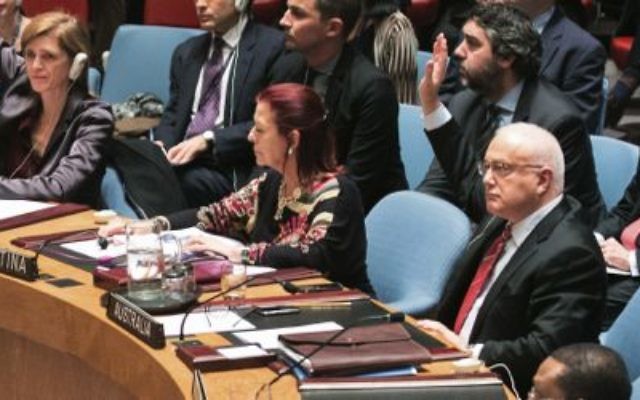Australia votes against Palestinian statehood
IN its final act as a member of the United Nations Security Council, Australia was last week one of just two countries to vote against a motion proposing Palestinian statehood.
IN its final act as a member of the United Nations Security Council, Australia was last week one of just two countries to vote against a motion proposing Palestinian statehood.
At the vote held on December 30, one day before the expiry of a two-year stint on the UNSC, Australia joined the United States in rejecting the Jordanian proposal which called for a full Israeli withdrawal from the West Bank by 2017 and an imposed timeline to end the conflict within a year.
It comes two years after Australia abstained, under the influence of then foreign minister Bob Carr, in a General Assembly vote to give the Palestinian Authority (PA) non-member observer status at the United Nations.
Australia secured the seat on the UNSC in late 2012, following a campaign in which critics claimed the then Labor government had turned its back on Israel on the international stage in order to secure support for its Security Council bid.
Last week, however, it threw its support firmly behind Israel, with Australia’s UN Ambassador Gary Quinlan saying the motion, “lacks balance and seeks to impose a solution put forward by one party alone … a process agreed by both sides is the only way forward to reach an enduring agreement.”
He added, “Australia urges all parties to refrain from provocative actions, and for leaders from both sides to show real courage in returning to the difficult path of peace negotiations.”
The stance has been welcomed by Australia’s Jewish community, with Executive Council of Australian Jewry president Robert Goot applauding the government for “its principled vote” against the draft resolution.
“Australia’s explanation of its vote is impeccable,” he said.
“The draft resolution sought to impose a solution, including an outcome on borders, refugees and Jerusalem, instead of the parties arriving at a solution through direct negotiations, as required by all previous agreements.”
Australia/Israel & Jewish Affairs Council executive director Colin Rubenstein called the proposal “a clear step backward” for a negotiated peace.
“This completely one-sided resolution reflected the Palestinian preference for confrontation and further conflict, rather than returning to direct negotiations with Israel in a spirit of reconciliation,” he said.
He said the Palestinian leadership “apparently remains either unwilling or unable” to accept a sovereign Palestinian state in the West Bank and Gaza “if doing so would require entering into a genuine peace agreement with Israel and making the compromises necessary” to end the conflict.
“The genuine peace both peoples undoubtedly need can only be achieved by direct negotiations, as the Australian government wisely recognised,” he said.
Eight countries voted for the motion while five abstained.
The motion would have needed nine votes and no veto – which the United States would almost certainly have used to block it – to pass.
In 2012, Bob Carr infamously threatened to roll then prime minister Julia Gillard – who wanted to vote no to the General Assembly proposal – in order to make her change her mind and abstain.
GARETH NARUNSKY
Australia’s Ambassador to the UN Gary Quinlan voting against last week’s Palestinian statehood resolution. Photo: UN Photo/ Evan Schneider


comments